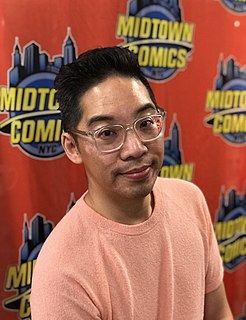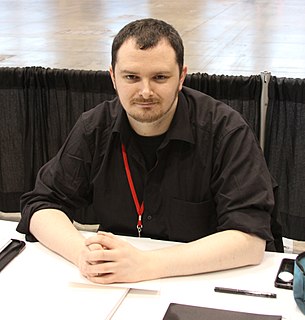A Quote by Brian Stelfreeze
I'm always a little nervous when someone comes from other media into writing comics. It's a unique storytelling form, and it requires both talent and respect.
Related Quotes
Any platform that you use to tell stories helps you regardless of the medium regardless if they are bedtime stories that you tell your children or comics or film. Specifically what makes comics unique is that they are a storytelling device that forces you to think both visually and economically. Some might say you are limited by your imagination, but that is not true because someone has to draw it.
I love writing and the little filmmaking I have attempted, but comics is the means of artistic expression that feels most comfortable to me. It's also still a largely uncharted medium with enormous unrealized potential. I like finding new ways to communicate an idea or a feeling, ways that can't be duplicated in other media, so I take great pleasure in the invention and exploration that comics necessitates.
Storytelling is one of comics' esthetic hurdles at the moment, which was the novelist's problem 150 years ago: namely, to take comics from storytelling into that of "writing," the major distinction between the two to me being that the former gives one the facts, but the latter tries to recreate the sensation and complexities of life within the fluidity of consciousness and experience. As far as I'm concerned, that's really all I've been trying to do formally for the past decade or more with comics, and it's certainly time-consuming, since it has to be done with drawings, not words.
That's the type of thing you need to keep in mind when drawing comics. The storytelling. Consider the action and the space available to you, that's what will make it a great comics page. Once you've figured that out, you can always find/make the reference to support your storytelling decisions. So by all means, study film, but as with any reference, the results are better when they inform the craft and not dictate it.
I never feel there's anything I can't do with comics. There are certain things in comics that you can't do in any other medium: for instance, in Mister Wonderful, Marshall's narration overlaps the events as they're going on. That would be difficult in film; you could blot speech out with a voiceover, but it wouldn't have the same effect. That's always of interest, to see what new things you can do in comics form.
According to this law [the law of Dharma], you have a unique talent and a unique way of expressing it. There is something that you can do better than anyone else in the whole world--and for every unique talent and unique expression of that talent, there are also unique needs. When these needs are matched with the creative expression of your talent, that is the spark that creates affluence. Expressing your talents to fulfill needs creates unlimited wealth and abundance.
Marriage requires the giving and keeping of confidences, the sharing of thoughts and feelings, respect and understanding always, marriage requires humility - the humility to repent, the humility to forgive. Marriage requires flexibility (to give and take) and firmness: not to compromise principles. And a wise and moderate sense of humor. Both need to be pulling together in the same direction.
Television is what we call the long form of storytelling, where we tell stories over thirteen, twenty-two, or twenty-four hours. Miniseries is an eight-hour form of storytelling, and film is a two-hour form. Each and every one of them are important to me, because they're a different modality of storytelling.








































